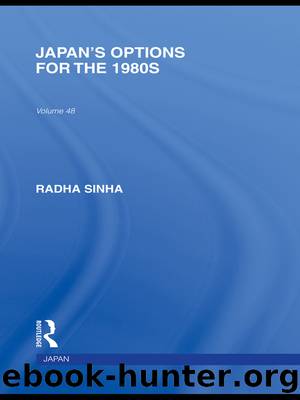Japan's Options for the 1980s by Radha Sinha

Author:Radha Sinha [Sinha, Radha]
Language: eng
Format: epub
Tags: History, Asia, Japan, Reference, General, Social Science, Ethnic Studies, Regional Studies
ISBN: 9781136912931
Google: AAbGBQAAQBAJ
Publisher: Routledge
Published: 2010-10-18T01:16:03+00:00
The OPTAD is conceived to âdevelop along the lines of the OECD in Europeâ77 but at the same time incorporating the objectives of GATT and UNCTAD. The authors of the idea make no secret of the fact that OPTAD is conceived as a counterbalance to the growing economic power and trade protectionism of the EEC. They stress that:
global institutions and mechanism no longer provide an adequate framework for dealing with the Pacific economy for reasons both of commercial diplomacy and of political strategy. The weight and structure of established Atlantic and European interests in international economic diplomacy are heavily directed towards trade share stabilisation and reactive protection of the present international order, and against constructive adjustment to dynamic economic growth such as that taking place in Asia and the Pacific. The preoccupations of the major European industrial economies in their individual and collective approaches to external adjustment during the 1970âs have led them further away from automatic support for a free and open international trading environment.78
One can sympathise with the feelings of the promoters of the ideas of OPTAD that the existing power structure of the global organisations (including the UN agencies) gives much more weight to the US and European countries at the neglect of Japan, Australia and the Third World countries, and therefore does not adequately represent present-day reality. Nor can one deny that in order to revitalise such organisations there is a need for drastically altering their power structure. This is essentially what the Third World has been asking for under its (often misunderstood) slogan of the New International Economic Order (NIEO). Strangely enough, both Japan and Australia have consistently made a common cause with the USA and the EEC and thwarted the Third Worldâs effort to bring about such a restructuring. There is hardly any reason to suggest that the behaviour of Japan or Australia would suddenly change towards the developing countries once a new organisation such as OPTAD is created. If these two countries are looking for a âroleâ they are reasonably well represented in the regional as well as in global organisations. They can, if they wish, play a significant role in co-operation with the Third World and the Scandinavian countries. After all, the Scandinavian countries have played a reasonably active role in the UN system without having much political power.
By and large, it is almost certain that South-east Asian countries will continue to accept Japanese foreign investment, but the suspicions will continue. It is for this reason that the ASEAN is now developing more links with the EEC. It is also possible that with growing experience, ASEAN and other developing countries will impose stricter conditions in future and demand reciprocity in trade, particularly in the import of labour-intensive goods such as textiles. It must be remembered that Japan, under the Generalised System of Preferences (GSP), provides duty-free treatment on imports of most manufactured and semi-manufactured products from a large number of developing countries.79 Japanâs list of beneficiaries is broader than those of the
Download
This site does not store any files on its server. We only index and link to content provided by other sites. Please contact the content providers to delete copyright contents if any and email us, we'll remove relevant links or contents immediately.
Harry Potter and the Goblet Of Fire by J.K. Rowling(3040)
Never by Ken Follett(2879)
Shadow of Night by Deborah Harkness(2718)
Ogilvy on Advertising by David Ogilvy(2682)
Zero to IPO: Over $1 Trillion of Actionable Advice from the World's Most Successful Entrepreneurs by Frederic Kerrest(2389)
The Man Who Died Twice by Richard Osman(2297)
Machine Learning at Scale with H2O by Gregory Keys | David Whiting(2285)
Book of Life by Deborah Harkness(2263)
How Proust Can Change Your Life by Alain De Botton(2259)
My Brilliant Friend by Elena Ferrante(2223)
0041152001443424520 .pdf by Unknown(2219)
The Tipping Point by Malcolm Gladwell(2204)
How to Pay Zero Taxes, 2018 by Jeff A. Schnepper(2098)
Will by Will Smith(2040)
Purple Hibiscus by Chimamanda Ngozi Adichie(1981)
Hooked: A Dark, Contemporary Romance (Never After Series) by Emily McIntire(1954)
Borders by unknow(1785)
Rationality by Steven Pinker(1764)
Daughter of Smoke and Bone by Laini Taylor(1742)
